About Us
The Origin of Our Company Name; Kings Mushroom Production and Marketing Enterprise
Greeks believed mushroom provides strength in battle. The Chinese treasured mushrooms as a health food the elixir of life. The Egyptians regarded them as food for Pharaohs. Romans regarded it as food of the gods. Moreover, the Romans were very fond of mushrooms; often it was the lord of the house himself who prepared mushrooms. Story goes that picking the Emperor’s Amanite (Amanita caesarea) was punished by cutting off the hands of the offender.
Here Kings’ Mushroom Production and Marketing Enterprise present the special dish of kings, pharaohs, and gods. Hence, by making our mushrooms part of your daily diet, be a king of the 21st century.
Kings’ Mushroom Production and Marketing Enterprise
Established: in 2008
Location: Bahir Dar, Ethiopia
Founder and Manager of the Enterprise:
Kiflemariam Yehuala Belachew
Vision
To see mushrooms being produced, marketed, and consumed as fruits and vegetables in Ethiopia
Mission
Scaling up of mushroom production, marketing, and utilization technologies into the wider population or beyond the project area in both time and space.
Strategy
v Improving mushroom production technology;
v
Improving market access;
v Improving postharvest handling techniques; and
v Introducing mushroom utilization methods through continuous training, learning, research, and innovation processes.
Value
Advocating and practicing environmentally friendly production and waste disposal technologies.
Goal
Be gainful in mushroom production, training, marketing, and technology transfer.
Objectives
Short-term objectivesv Production and marketing of fresh mushrooms and spawn; and
v Provision of trainings on mushroom production, postharvest handling, and utilization.
Long-term objectives
v Continuing in spawn production and marketing
v Continuing in provision of trainings on mushroom production, postharvest handling, and utilization;
v Providing technical support for trained and other mushroom producers;
v Conducting research on techniques of mushroom production, postharvest handling and marketing, substrate types and formulation;
v Searching better mushroom marketing opportunities whenever possible; and
v Receiving fresh mushrooms from producers, packaging (and/or canning) and marketing for domestic and export markets when excess of production is attained.
Strength, Gaps, and Opportunity of the Project
Strength of the project· Keen interest of the beholder of the project in mushrooms;
· Technical expertise of the project owner in mushroom production, research, and utilization.
Gaps of the Project
· Dearth of initial investment capital to fulfill the machinery requirement of the project’s spawn (or mushroom seed) laboratory. Because of this the project is forced to transport the spawn from Addis Ababa. Even with this arrangement, spawn producers are not in a position to maintain their promise of delivery date, sometimes delaying for more than 6 weeks after the spawn was supposed to handover to our project.
Opportunity of the project
· Products good future, i.e., production and marketing of fresh mushrooms is gaining great interest among the public and policy makers of the country;
· Existence of market demand for fresh mushrooms in Bahir Dar;
· Acquisition of sufficient area of land for future expansion and spin offs
· Availability of cheap labor source; and
· Availability of raw material (agricultural materials and agro-processing wastes) locally with relatively low prices.
Brief Profile of the Entrepreneur
I, Kiflemariam Yehuala, who is the owner and manager of the project, is currently working as lecturer at Bahir Dar University, Department of Plant Sciences. I pursued my BSc and MSc Degree in Plant Sciences and Horticulture, respectively at Alemaya University. On top of my teaching and research experience, I have also experiences in agricultural extension and project coordination.
Presently, I have established a horticultural farm being producing mushrooms, different types of vegetables, and fruit tree seedlings in Bahir Dar, Zenzelima Kebelle. My enterprise is named as ‘Kings’ Mushroom Production and Marketing Enterprise’. My formal business career begins as I won the 2007 national BISPLAN competition and secured 15,000.00 USD awarded by Ministry of Trade and Industry, Enterprise Ethiopia, Business Management Unit. However, my informal business career begins when I established my own artificial forest plantation at the brink of Chagni covering about 2.5 ha of land in the year 1996. Consequently, I have benefited immensely from the sale of the first harvest while contributing to the local environment and demonstrating the benefits of tree planting for local community rather than relying on the natural forest.
Current Status of the Project
Till date, i.e., until 28 May 2010 the project has invested a total investment capital of Birr 395,346.18. Out of this investment capital Birr 336,533.00, Birr 50,827.18, and Birr 7,986.00 have been invested for fixed assets, working capital and pre-operating expenses, respectively.
Civil works
Figure 1 mushroom growing room; spawn lab, office and store
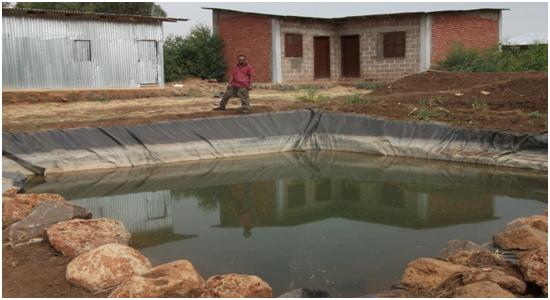
Front view of mushroom growing room & spawn lab, office & store, and pond of 120 m3 water capacity
The mushroom house
The mushroom growing room has a size of 35 m2 of net area which is an area capable of producing more than 216 kg of mushrooms in 60 days period or more than 600 kg of mushrooms per annum.
The walls of the house are built from hydraphome bricks whereas the roof is covered with corrugated iron sheet. Beneath the outer most of the roof, there exists 15 cm thick soil layer in order to reduce the temperature of the growing room. Mushrooms are produced in racks queued along the walls.
In this mushroom growing room, the project has conducted the production of oyster mushrooms for three consecutive periods. The first production was aimed at doing trial production, the second for marketing (or promotion) purpose, and the third is for distribution. Based on this, we have garnered good experiences that built our skill in mushroom production and for the subsequent development of mushroom production procedure specific to our farm in Bahir Dar.
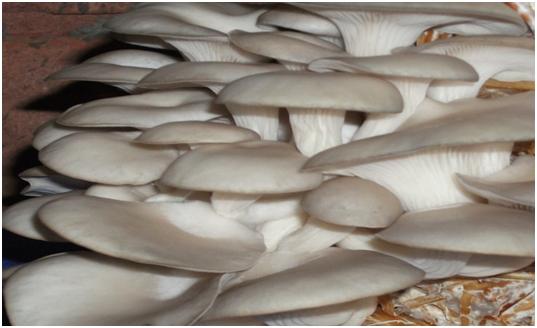
Figure 2 our mushrooms being under production
The spawn laboratory
nce of the growers it is possible to produce about 1000 kg of spawn on every day bases only by expanding the space of the laboratory. This amount of seed is sufficient to supply for about 200 small scale growers in the region. But our main problem is dearth of finance to equip and furnish the laboratory with the nec
Next to the mushroom growing house we have also built spawn (mushroom seed) laboratory from the same material as the growing room. The spawn laboratory has an area of 9 m2 of space. The laboratory has a capacity to enable the production of 250 kg mushroom spawns on daily bases. This quantity of spawn is able to supply sufficient seed for about 50 small scale mushroom growers on monthly bases or 100 small scale growers every other month.
However, looking the performa
essary laboratory equipments and furniture. As a result we are forced to solely depend on the shipment of spawn from Addis Ababa, which is retarding our performance in the amount of mushrooms we produce, consequently, wasting our time and money.
Vegetables
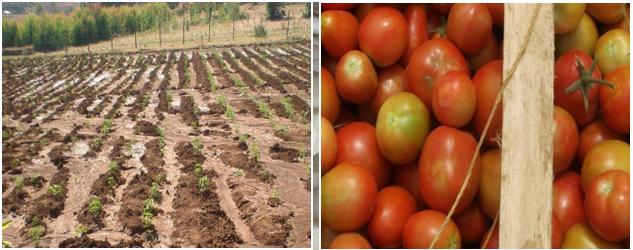
Figure 3 land preparation and our tomato produces
Fruit tree seedlings
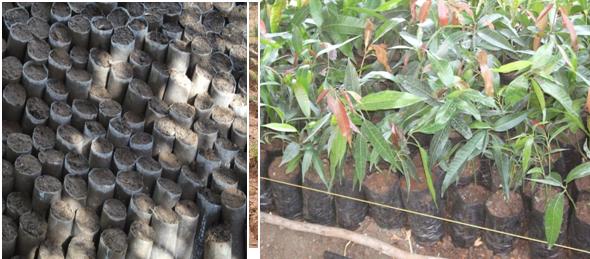
Figure 4 fruit seedling production
Employment created by the farm
Currently, the farm has employed 5 permanent and 2 casual labors almost in a permanent base. As a result, we are currently paying a monthly salary of Birr 3,650.00.
Spinoffs and Future Direction of the Farm
Product Components of the Farm
v Fresh mushrooms;
v Mushroom spawns;
v Vegetable crops including leafy, fruit, and root and tuber vegetables;
v Intermediate perennial fruits including banana and papaya;
v Fruit tree seedlings, which are grafted and of high quality such as mango, avocado, etc; and
v Fattening of sheep at least three stocks a year.
Training Components of the Farm
Provision of training on the production of fresh mushrooms;
Provision of training on clonal propagation of horticultural crops;
Planning, Establishment, and Management of Commercial Nursery Sites;
Planning, Establishment, and Management of Orchards and Vegetable Farm; and
Provision of training on the postharvest handling of horticultural crops.
The new organizational structure of the farm
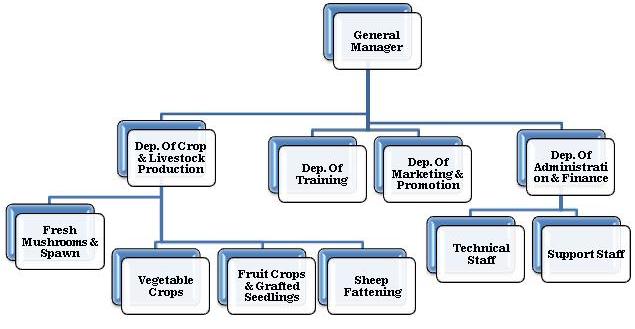
Figure 6 the new organizational structure of the farm


Kiflemariam Y. Belachew (Founder)
Our mushrooms
Our mushrooms
Kings Mushroom spawn preparation for own consumption and sale
We also go wild
The new training hall under construction
Our nursery site for mangoes and avocadoes
Training is the main component of our community service